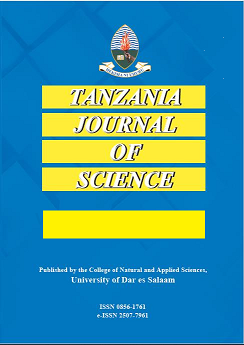Wastewater Clarification and Microbial Load Reduction Using Agro-Forestry and Agricultural Wastes
DOI:
https://doi.org/10.4314/tjs.v47i1.3Keywords:
Domestic Wastewater, Clarification, Agro-Wastes, Turbidity, Microbial LoadAbstract
Five agro-wastes, namely: cassava peels, Irish potato peels, Jatropha curcas seeds, Moringa oleifera seeds and rice husks were investigated as plant-based coagulants for turbidity and microbial load removal from sewage wastewater. Moringa oleifera and Jatropha curcas seeds before usage were defatted with 95% ethanol and the active coagulating component was extracted with 1.0 M NaCl. For the other three agro-wastes, their ashes were evaluated for turbidity and microbial load removal. The ash was prepared through pyrolysis of the raw biomass at a temperature of 800 °C for 3 h. The effect of pH, coagulant dose, settling time on turbidity reduction was investigated using sewage wastewater with an initial turbidity of 464.11 ± 0.13 NTU. The microbial load removal of the coagulants was investigated using three media onto which 1 mL of treated wastewater was poured and streaks were made using sterile swabs and then incubated at 37 °C for 24 h. Jatropha curcas and rice husks ashes exhibited the maximum turbidity reduction of 97.0% and 95.0%, respectively at pH 2, whereas for Moringa oleifera, the highest turbidity removal (96.0%) was achieved between pH 6 and 10. Additionally, it was observed that the electrical conductivity and total dissolved solids of the clarified wastewater increased as the doses were increased for all coagulants due to inorganic salts contained in seeds. The microbial load understudy was successfully reduced in wastewater clarified with Jatropha curcas and rice husks ashes, contrary to Moringa oleifera that increased microbial load content. The raw biomass and ashes for cassava and Irish potato peels could not clarify sewage wastewater. The results from this study have demonstrated that plant-based materials used performed effectively in turbidity and bacteria removal from sewage wastewater.
Keywords: Domestic Wastewater; Clarification; Agro-Wastes; Turbidity; Microbial Load


